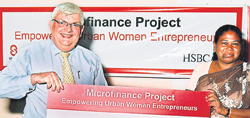|
HSBC’s new programme to empower rural women HSBC launched a new microfinance programme recently committing funds in excess of Rs 13 million. The project titled ‘Empowering Urban Women Entrepreneurs’, and carried out in collaboration with South Asia Partnership Sri Lanka (SAPSRI) aims to raise the income levels of women living in under-privileged urban areas in Colombo to avail themselves of regular banking facilities, the bank said. By providing these local communities an opportunity for self-sustenance and livelihood, it is hoped they will eventually be in a position to grow their business into a thriving enterprise. The aim of the programme is to increase entrepreneurial capabilities of a group of three hundred women through micro-credit, in Colombo and its suburbs. Initiated by HSBC’s Corporate Banking sector, the programme focuses on giving women entrepreneurs from low-income groups access to credit facilities, which might not otherwise have been afforded to them. Under this programme, microfinance will be used as a tool to formalise the existing saving patterns of the urban poor, relieving many of them from money-lenders who charge high rates. It will also assist in making them credit-worthy, putting them in a position to deal directly with formal financial institutions.
Speaking at the launch of the programme, Dr Padma Ratnayake, Director of SAPSRI said, “South Asia Partnership is happy to be associated in bridging the link between HSBC and a marginalised community who would never have approached such an international financial institution otherwise.” She said HSBC should be happy that they are reaching out to help a group of women who work from dawn to dusk to give their children a better life and a more hopeful future. Trevine Fernandopulle, deputy chief executive officer, HSBC Sri Lanka and head of corporate banking said, “We believe that reaching out to communities through programmes of this nature is important, particularly because their development is vital to the development of the country as a whole.” |
||||
Copyright © 2006 Wijeya Newspapers
Ltd. All rights reserved. |
